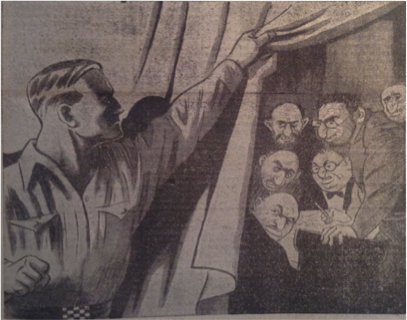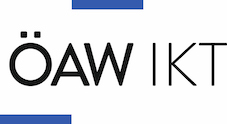VWI goes to ... / VWI invites ...
Der Kolloquienzyklus der VWI-Fellows
Die VWI-Fellows präsentieren Zwischenresultate ihrer Forschungsvorhaben im Rahmen von Kolloquien, die – im kleinen Rahmen angekündigt – auch einer akademisch und inhaltlich interessierten Öffentlichkeit zugänglich sind. Die Vorträge werden durch eine im jeweiligen Thema ausgewiesene Fachperson in Form einer Respondenz oder eines Kommentars begleitet und von den anderen Fellows und dem Publikum diskutiert.
Das Veranstaltungsformat VWI goes to … war ursprünglich aus akutem Raummangel geboren worden, konnte doch das Institut an seinem früheren Standort, am Desider-Friedmann-Platz nicht einmal eine kleine Veranstaltung organisieren. Allein aus dem Kontakt zu anderen akademischen Einrichtungen in Wien, zum Teil auch in der weiteren Region, ergab sich in der Folge – auch dank der jeweils eingeladenen Kommentatorinnen und Kommentatoren – wiederum die einzigartige Möglichkeit, die Fellows und die Forschungen des VWI mit anderen Institutionen, methodischen Ansätzen, Forschungsfragen und Ideen zu vernetzen, das Institut in den regionalen Forschungsraum noch mehr zu integrieren. Aus diesem Grund wurde entschieden, das Format auch am neuen Standort beizubehalten. Gleichzeitig eröffnete sich aber am Rabensteig auch die Gelegenheit, zu diesen Kolloquien Institutionen auch an das VWI einzuladen. Aus diesem Grund trägt ab Herbst 2016 das VWI-Kolloquium entsprechend alternierend auch die Bezeichnung VWI invites... .
| VWI invites/goes to... | |||
| Lovro Kralj: Paving the Road of Death. Antisemitism in the Ustasha Movement 1929–1945 | |||
Mittwoch, 15. Jänner 2020, 15:00 - 17:00 Vienna Wiesenthal Institute, Research Lounge 1010 Vienna, Rabensteig 3, 3rd Floor
|
|||
VWI invites the Institute of Culture Studies and Theatre History at the Austrian Academy of Sciences
Commented by Ljiljana Radonić Lovro Kralj specialises in the fields of fascism, antisemitism, and Holocaust studies, with a geographic focus on Central and Southeastern Europe. In 2015, he started his PhD at the Central Eu-ropean University. Kralj has participated and presented at more than twenty international workshops and conferences, including Lessons & Legacies. He has received multiple fellowships, including the Sharon Abramson Research Grant for the Study of the Holocaust from the Holocaust Educational Foundation and a Junior Fellowship at the Vienna Wiesenthal Institute for Holocaust Studies. Ljiljana Radonić heads an ERC project entitled Globalized Memorial Museums. Exhibiting Atrocities in the Era of Claims for Moral Universals at the Institute of Culture Studies and Theatre History of the Austrian Academy of Sciences in Vienna. She wrote her habilitation on World War II in Post-Communist Memorial Museums at the Department of Political Science at the University of Vienna. Her PhD dealt with the War on Memory. Croatian Memory Politics between Revisionism and European Standards, Frankfurt 2010. Please register at Diese E-Mail-Adresse ist vor Spambots geschützt! Zur Anzeige muss JavaScript eingeschaltet sein! by latest 14 January, 12.00 am and bring your ID! Click here to download the invitation as a PDF file. In cooperation with |
|||






 This presentation reinterprets the importance of antisemitism in the fascist Croatian Ustasha movement. Given the fact that the Ustasha ideological core was initially not antisemitic, questions as to why and how they adopted antisemitism have not been adequately answered to date. In this presentation, Kralj will challenge historiographical interpretations which reduce Ustasha antisemitism to a mere imitation of Nazism as well as the arguments that the Ustashe only participated in the Holocaust because of German pressure or appeasement. Kralj argues that the Ustashe adopted antisemitism as a key tool in the fascistisation of its ideology. The adoption of anti-communism, anti-capitalism, anti-democratic, and other attitudes were so closely intertwined with antisemitism that it became one of the main tools of ideology-building in the period from 1935 to 1940. Kralj will examine the interdependence of antisemitism and fascistisation through a quantitative analysis of Croatian National Socialist, clerical, nationalist, and Ustasha press in the period from 1929 to 1945.
This presentation reinterprets the importance of antisemitism in the fascist Croatian Ustasha movement. Given the fact that the Ustasha ideological core was initially not antisemitic, questions as to why and how they adopted antisemitism have not been adequately answered to date. In this presentation, Kralj will challenge historiographical interpretations which reduce Ustasha antisemitism to a mere imitation of Nazism as well as the arguments that the Ustashe only participated in the Holocaust because of German pressure or appeasement. Kralj argues that the Ustashe adopted antisemitism as a key tool in the fascistisation of its ideology. The adoption of anti-communism, anti-capitalism, anti-democratic, and other attitudes were so closely intertwined with antisemitism that it became one of the main tools of ideology-building in the period from 1935 to 1940. Kralj will examine the interdependence of antisemitism and fascistisation through a quantitative analysis of Croatian National Socialist, clerical, nationalist, and Ustasha press in the period from 1929 to 1945.